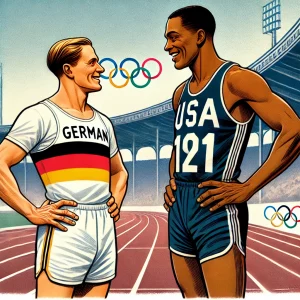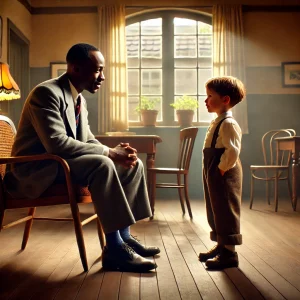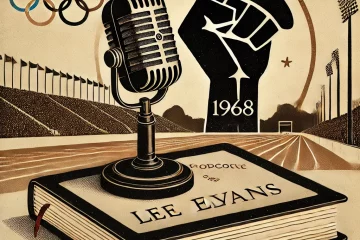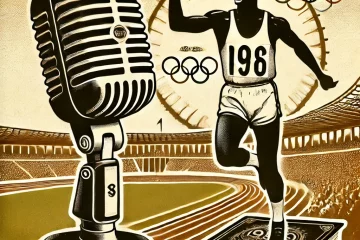The Friendship of Jesse Owens and Luz Long
 At the 1936 Berlin Olympics, beneath the imposing shadow of swastika banners, an African-American son of sharecroppers and a German law student etched a story of friendship into the annals of history. Jesse Owens and Carl Ludwig “Luz” Long, competitors in the long jump, turned a politically charged atmosphere into a stage for a remarkable display of humanity and sportsmanship.
At the 1936 Berlin Olympics, beneath the imposing shadow of swastika banners, an African-American son of sharecroppers and a German law student etched a story of friendship into the annals of history. Jesse Owens and Carl Ludwig “Luz” Long, competitors in the long jump, turned a politically charged atmosphere into a stage for a remarkable display of humanity and sportsmanship.
The 1936 Berlin Olympics: A Stage Set by Tension
In 1936, Berlin was more than just a city hosting the Olympics; it was a showcase for Nazi propaganda, presenting Germany as a reborn powerhouse under Adolf Hitler. Amidst this, athletes like Jesse Owens arrived, bearing not just their national pride but the burden of contradicting Nazi racial ideologies. Owens, particularly, stood under intense scrutiny, both from the Nazis, who hoped he would fail, and from those back home, eager for him to defy Hitler’s theories of Aryan supremacy.
The Meeting of Two Champions
It was during the long jump competition that Jesse Owens first encountered Luz Long, the tall, blond epitome of the so-called Aryan ideal. When Owens faltered in the qualifiers, Long’s advice to him to adjust his takeoff point was instrumental, helping Owens qualify and eventually win the gold. This act, simple yet profound, spoke volumes about Long’s character and their burgeoning respect for one another.
|
A Bond Beyond Borders
As the games continued, Owens and Long’s friendship blossomed. They were often seen together in the Olympic Village, and their camaraderie was a visible contrast to the prevailing Nazi rhetoric. Their bond was not just a fleeting sportsmanship but a profound connection that brought them together in subsequent years, even as the world around them braced for war.
A Promise Kept
Years after the echoes of war had faded, Jesse Owens made a poignant trip to Germany, fulfilling a heartfelt promise made by his dear friend, Luz. Before his untimely death in World War II, Luz had written to Owens, entrusting him with a deeply personal request—to visit his son Kai-Heinrich if he did not return from the war. This letter, which Owens kept as a treasured reminder of their bond, compelled him to make the journey once the war ended.
 Upon meeting Long’s son, Owens was moved by the young boy’s resemblance to his father, both in appearance and in spirit. It was a bittersweet moment, bringing back vivid memories of his time with Long at the Olympics and the friendship that had defied the oppressive ideologies of the time. Owens spent time sharing stories about Luz, painting a picture of a man who was not just a remarkable athlete but a true friend who stood up for what was right, irrespective of the consequences.
Upon meeting Long’s son, Owens was moved by the young boy’s resemblance to his father, both in appearance and in spirit. It was a bittersweet moment, bringing back vivid memories of his time with Long at the Olympics and the friendship that had defied the oppressive ideologies of the time. Owens spent time sharing stories about Luz, painting a picture of a man who was not just a remarkable athlete but a true friend who stood up for what was right, irrespective of the consequences.
Reflecting on his visit, Owens later recounted in his biography, “Seeing Luz’s son brought everything full circle for me. I told him about how his father and I stood together on the field, how he reached out to me despite the watchful eyes of his countrymen and a hostile regime. It was Luz’s courage that inspired me to keep going, to win not just for myself but for us both. I hope I was able to pass on some of his father’s spirit to him. That day, I didn’t just see Luz’s son; I felt Luz was there with us, smiling and as hopeful as ever.”
The story of Jesse Owens and Luz Long friendship transcends mere athletic achievement. It is a poignant reminder of the power of human connection over divisiveness. In Owens’ words, “It took a lot of courage for him to befriend me in front of Hitler… You can melt down all the medals and cups I have and they wouldn’t be a plating on the 24-karat friendship that I felt for Luz Long at that moment.” Their story continues to inspire and resonate, a beacon of hope and friendship against the darkest of backdrops.
Find out more!
Book: Bachrach, Susan D. The Nazi Olympics: Berlin 1936.
Documentary: Jesse Owens Returns to Berlin


0 Comments